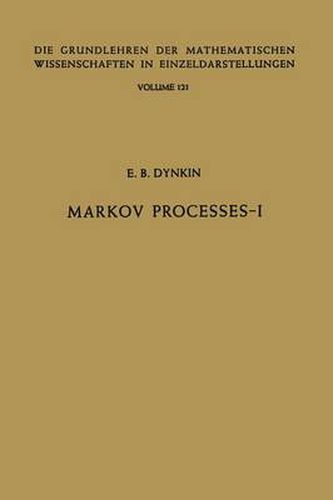Readings Newsletter
Become a Readings Member to make your shopping experience even easier.
Sign in or sign up for free!
You’re not far away from qualifying for FREE standard shipping within Australia
You’ve qualified for FREE standard shipping within Australia
The cart is loading…






This title is printed to order. This book may have been self-published. If so, we cannot guarantee the quality of the content. In the main most books will have gone through the editing process however some may not. We therefore suggest that you be aware of this before ordering this book. If in doubt check either the author or publisher’s details as we are unable to accept any returns unless they are faulty. Please contact us if you have any questions.
The modem theory of Markov processes has its origins in the studies of A. A. MARKOV (1906-1907) on sequences of experiments connected in a chain and in the attempts to describe mathematically the physical phenomenon known as Brownian motion (L. BACHELlER 1900, A. EIN STEIN 1905). The first correct mathematical construction of a Markov process with continuous trajectories was given by N. WIENER in 1923. (This process is often called the Wiener process.) The general theory of Markov processes was developed in the 1930’s and 1940’s by A. N. KOL MOGOROV, W. FELLER, W. DOEBLlN, P. LEVY, J. L. DOOB, and others. During the past ten years the theory of Markov processes has entered a new period of intensive development. The methods of the theory of semigroups of linear operators made possible further progress in the classification of Markov processes by their infinitesimal characteristics. The broad classes of Markov processes with continuous trajectories be came the main object of study. The connections between Markov pro cesses and classical analysis were further developed. It has become possible not only to apply the results and methods of analysis to the problems of probability theory, but also to investigate analytic problems using probabilistic methods. Remarkable new connections between Markov processes and potential theory were revealed. The foundations of the theory were reviewed critically: the new concept of strong Markov process acquired for the whole theory of Markov processes great importance.
$9.00 standard shipping within Australia
FREE standard shipping within Australia for orders over $100.00
Express & International shipping calculated at checkout
This title is printed to order. This book may have been self-published. If so, we cannot guarantee the quality of the content. In the main most books will have gone through the editing process however some may not. We therefore suggest that you be aware of this before ordering this book. If in doubt check either the author or publisher’s details as we are unable to accept any returns unless they are faulty. Please contact us if you have any questions.
The modem theory of Markov processes has its origins in the studies of A. A. MARKOV (1906-1907) on sequences of experiments connected in a chain and in the attempts to describe mathematically the physical phenomenon known as Brownian motion (L. BACHELlER 1900, A. EIN STEIN 1905). The first correct mathematical construction of a Markov process with continuous trajectories was given by N. WIENER in 1923. (This process is often called the Wiener process.) The general theory of Markov processes was developed in the 1930’s and 1940’s by A. N. KOL MOGOROV, W. FELLER, W. DOEBLlN, P. LEVY, J. L. DOOB, and others. During the past ten years the theory of Markov processes has entered a new period of intensive development. The methods of the theory of semigroups of linear operators made possible further progress in the classification of Markov processes by their infinitesimal characteristics. The broad classes of Markov processes with continuous trajectories be came the main object of study. The connections between Markov pro cesses and classical analysis were further developed. It has become possible not only to apply the results and methods of analysis to the problems of probability theory, but also to investigate analytic problems using probabilistic methods. Remarkable new connections between Markov processes and potential theory were revealed. The foundations of the theory were reviewed critically: the new concept of strong Markov process acquired for the whole theory of Markov processes great importance.